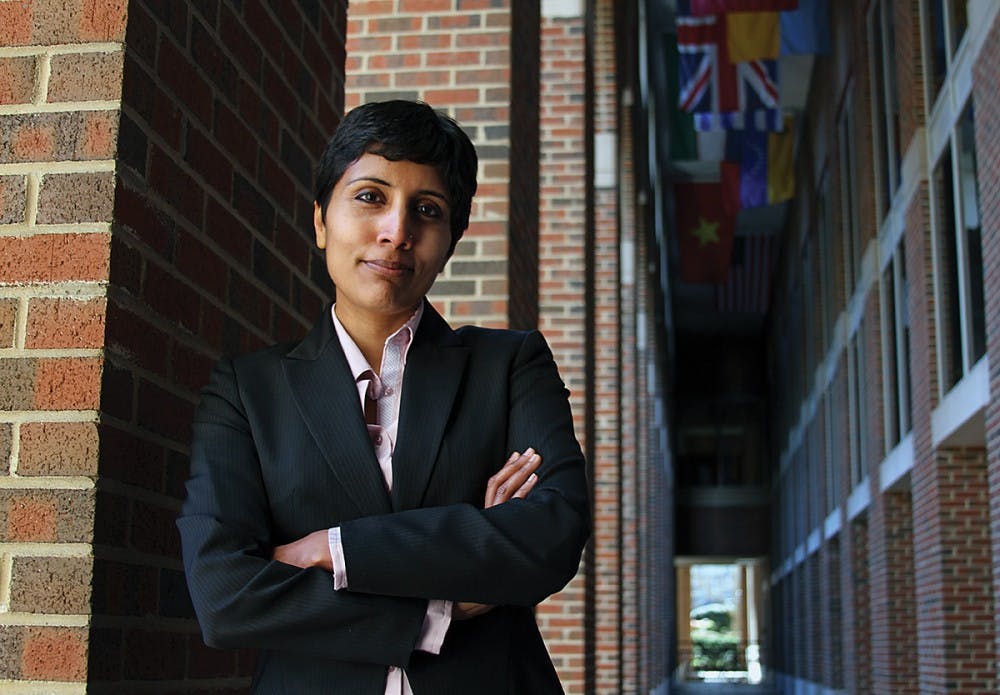Outnumbered
Desai, an assistant professor of organizational behavior, said although she hopes parity will soon be achieved at the graduate level, faculty are significantly outnumbered by men, posing a challenge to overcoming gender gaps.
“In the classroom, as the minority, we have to work harder at proving our expertise, our credentials and asserting our legitimacy in being in the role of the instructor,” Desai said.
“Other female faculty members reported facing similar issues. I am no longer surprised when students report in their evaluation, ‘An older man ought to be teaching this class.’”
Elizabeth Dickinson, a professor of corporate communication at Kenan-Flagler, said the small number of tenured women is not the main shock.
“It doesn’t surprise me that there are fewer females with tenure,” she said. “I guess what does surprise me is that there’s not more of an effort to create equality in that area.”
Jack Evans, interim dean of Kenan-Flagler, said the school values recruiting diverse faculty members, though racial minority representation has been more difficult to achieve.
There is only one black full-time professor at Kenan-Flager and two hispanic professors.
“If you think about recruiting and hiring as a pipeline, the front end of the pipeline is the broad pool of people you have to consider,” Evans said.
“The focus here would be on tenure-track positions. We seek people who will be able to develop productive research programs, and we want diversity as a characteristic of our tenure-track appointments.”
Senior Associate Dean of Kenan-Flagler Jennifer Conrad said in addition to individual programs focusing on gender and racial minority diversity, administrators regularly discuss ways to address the subject.
Dickinson said though she does not know how often men discuss gender diversity, it it is a common conversation topic among her and her colleagues.
To get the day's news and headlines in your inbox each morning, sign up for our email newsletters.
“There are women who I talk to in the hallways — we talk about how difficult it is to do research with family responsibilities, how difficult tenure is.”
A leaky pipeline
The hardships that accompany women entering the business sphere in academia are widespread, as a New York Times Harvard Business Study revealed in September. At Harvard’s business school, 20 percent of tenured professors are women.
Highlighting significant lack of gender diversity, Harvard’s study in many ways mirrors an undercurrent of gender issues at other universities.
Top business schools tend to reveal similar gender and race breakdowns to UNC’s, said Jo-Ellen Pozner, assistant professor of organizations at the University of California-Berkley’s Berkeley-Haas Business School.
“In general, female students speak up less, and female faculty get systematically lower scores on their end of term evaluations, a difference that cannot be explained by teaching ability, subject matter expertise or experience, based on a recent statistical analysis,” Pozner said.
“Historical research also shows that women and underrepresented minorities are shut out of central business school social networks, and in particular, women are intentionally excluded by men.”
‘Twice as good’
There are many factors contributing to the leaky pipeline in business other than balancing work and family.
Some of Desai’s senior colleagues at other universities have said the old adage that women do need to be twice as good as a man to succeed at the same job might be true.
“These women said they often felt excluded when the conversation would be dominated by basketball scores or there would be beer outings scheduled for times when their kids needed to be picked up from daycare,” Desai said.
Even if faculty numbers are lower, Conrad said the future remains bright for female students.
“Although they account for slightly less than 30 percent of the student body, female students in the last four academic years have accounted for half of our Dean’s Fellows students, 40 percent of our core value award recipients and 37 percent of our elected student leaders,” Conrad said.
Associate Dean of the MBA Program Sridhar Balasubramanian said vice presidents of the communication, diversity and finance clubs are women, as are multiple clubs, such as Carolina Women in Business and an LGBTQ group, Kenan-Flagler Business School Pride.
Stephanie Michael, a business administration major and president of Carolina Women in Business, said she hasn’t had a female professor yet, except when one came in halfway through the semester.
“But I wouldn’t say I’d prefer a male professor,” Michael said. “I think the industry may have something to do with it, and I haven’t heard my peers vocalize a preference for male over female professors.”
university@dailytarheel.com



